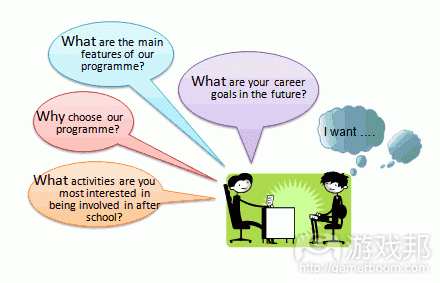分享游戏设计师的求职和面试技巧
作者:Elliot Pinkus
有多少出色的设计师因为忽视了求职技巧——展示自己的才能而被埋没?
最近,我有幸为Uken Games的“设计部门”(事实上,在招到新员工以前只有我一个成员)组织了一场面试。我自己也积累了不少求职经验,这一次的角色转换使我有机会换一种视角看待求职面试。与多位未来的设计师们交谈后,我发现他们都犯了几个常见的错误。
求职面试无绝对。总是涉及许多因素,比如由谁审阅你的求职申请、他们要求的着装正式程度。我往往会更全面地考察求职者,从他们的技能水平、职业展望、学习意愿到交流能力,等等。在这些考察范围内,你当然有办法从无数竞争者中脱颖而出。
1、申请合适的职位
从你的求职信到简历再到面试,都要明确表态你申请的是什么职位。在大多数时候,目标公司会公布职位描述。认真阅读和分析要点。如果公司的重心是基于文本的手机游戏,那么你就不要唠叨你多么擅长使用Unreal制作FPS地图。如果那恰好就是你的主要经验,那就尽量以适当的方式表述。比如,过去的经历如何促进你现在的工作?也许你的设计经验教会了你如何分析玩家行为和创造良好的游戏体验。
2、可靠的求职信
总是有一些你不能不重视的招聘经理和面试官,我认为他们也是影响求职面试的关键因素。一封诚恳的求职信会说服我忽略不太吸引人的简历,使我想进一步了解你的交流能力、个性、职业热情。最后一点是个关键,下面我还会说到。你的简历应该内容充实,不要重复求职信上的东西。你不必夸大你的能力,也不要长篇大论你如何与游戏结下不解之缘(我们也是从小到大玩游戏,省省吧)。你的表述重点应该是,你为什么想要这份工作,凭什么说你胜任这份工作。
3、(1)我不关心你写了多少GDD或多少页。
事实上,无论你说多少,都不会让人感兴趣的。你觉得GDD是什么?一份2页的提案或80页圣经?如果你写了30个游戏设计文案,但只做了一款游戏,那么我不得不怀疑其他方案是不是都不太好。给出页数似乎暗示了越多页越好,当然不是这么回事。你应该看看Stone Librande关于“一页纸搞定设计文案”的演讲。
(2)不要强调你有写文案的经验,而是将其作为开发过程的一部分。
是提案还是明智的执行文件?是说明性的(在指令下达以前准备好的)还是描述性的(在开发过程中阐明和记录)?在开发期间你是否不断更新?谁使用那些文案?
4、(1)表现你的热情
这一点相当重要,特别是在面试的时候。我想听到你热情洋溢地谈论这份工作。我不是要你挑剔你申请的公司,而是要你表现得好像你是在申请到这个世界上最优秀的公司工作。当然,最重要的是你对工作有激情。你不是在申请成为头号粉丝,你是在申请一份好工作。
(2)解释你为什么对成为游戏设计师充满热情
不仅要解释你为什么对游戏有热情(这是你应该的),还要解释你对设计师这个职业的热情。告诉我为什么你想经手设计的过程,而不是满足于游戏发行的结果?设计对你意味着什么?你是否喜欢平衡经济?会设计机制吗?关卡呢?研究过玩家行为吗?向我证明,你就是想做这份工作。成为游戏设计师是世界上最棒的工作,但它并不总是有趣的,也不是游戏(虽然你的工作对象确实是游戏,你懂得)。
5、体现你如何扮演设计师这个角色
向我展示你对设计过程的深入见解。告诉我你在设计时遇到的困难和解决方法。关键是强调你如何扮演设计师这个角色。这应该包括你经历的失败。如果你说的都是成功的经历,那你就错了。告诉我为什么你的设计被要求改变,你如何找到最佳解决方案。
6、不仅熟悉工作室,还有他们的工作领域
我们的工作室主要从事Facebook和手机社交RPG。我不指望求职者是这个领域的专家,但也不能对此一无所知。你必须了解这一行业的主要竞争者。对于手机游戏开发,最简单的方法就是看看排行榜上的前几名游戏(不只是下载量最多的),这样你就知道在这一领域中,做什么才能成功。(本文为游戏邦/gamerboom.com编译,拒绝任何不保留版权的转载,如需转载请联系:游戏邦)
Tips for Game Designer Applications & Interviews
by Elliot Pinkus
How many skilled designers have their applications overlooked because they’re not communicating their abilities?
Recently I had the opportunity to run the interview process as Uken Games expanded its “Design Department” from just myself to a 3-person team. After plenty of experience as an applicant, being on the opposite side of the process was quite the perspective change. After talking to many prospective designers, I noticed a few common mistakes popping up time and time again.
Nothing here is absolute or a deal breaker. There are always many factors involved, like who is receiving your application and the degree to which they adhere to a formal rubric. I tend to look at applicants more holistically. It’s a gestalt impression of their skills, ambition, willingness to learn, ability to clearly communicate, and more. Within that impession there are certainly ways to make yourself stand out, both positively and negatively.
1) Make sure you’re applying for the right job.
This applies to everything from your cover letter, to your resume, to how you present yourself in interviews. In most cases there is a job description. Read it carefully and address the points mentioned. If a studio has thus far focused on text-based mobile games, don’t only talk about your experience making FPS maps in Unreal. If that is your primary experience, then try to frame it in the right way. How can you apply those experiences to the work you’d be doing? Maybe your designing levels taught you how to analyze player behavior and create great experiences.
2) Write a solid cover letter.
There will be hiring managers and interviewers that could not care less, but for me it’s a significant factor. An engaging letter may convince me to move forward on a lacking resume. I want to know that you can communicate, that you have a personality, that you can express why you want to be a game designer. That last piece is key and I’ll come back to it below. Give context to your resume, don’t repeat it. You don’t need to be effusive and hyperbolic about your abilities, and don’t tell your whole life story (yes, we’ve all been playing games since we were kids, got it). Focus on why you want this job, and why you’re a good fit.
3a) I DON’T care how many GDD’s you’ve written or how many pages they were.
In fact, numerical answers for those are a turn-off. What do you consider a GDD? Is it a 2-page proposal or an 80-page bible? If you’ve written 30 game design documents but made one game, I have to wonder if those other documents were not very good. And giving a page count seems to imply that more pages is better, which is absolutely not true and could be the subject of a whole other post. For now, go look up Stone Librande’s presentation about One-Page Design Docs.
3b) DO mention that you have experience writing documentation, but tie it into the development process.
Was it a proposal or specifically defining implementation? Was it prescriptive (prepared ahead of time as instructions) or descriptive (clarifying and tracking how things function as development progresses)? Were you constantly updating it during development? Who used the document?
4a) Show passion.
This is incredibly important, especially during an interview. I want to hear that you’re passionate about the job. And I don’t mean suck up to the company you’re applying for. Acting like who you’re applying to is the Greatest Company In The World only gets you so far. What’s more important is being passionate about the JOB. You’re not applying to be the #1 fan, you’re applying to do great work.
4b) Express why you’re passionate about being a Game Designer.
Now the important thing is not just why you’re passionate about GAMES (you should be, but that’s not exactly uncommon.) Why are you passionate about the role of DESIGNER? Tell me why you loooove to design, and don’t just focus on the end result of releasing a game. What about design really gets you going? Do you like balancing economies? Devising mechanics? Polishing levels? Studying player behavior? Convince me that you want to do the work. Being a game designer is the best job in the world, but it’s not all fun and games (well, it is games, but you know what I mean).
5) Be able to describe what it is you do as a game designer.
Impress me with insight into your thought process while designing. Talk about challenges and solutions you’ve come across while designing. Make sure to focus on what YOU did as a designer. This should involve talking about failures. If all your designs are perfect on the first pass, you’re doing it wrong. Tell my why your designs had to change and how you figured out the best solution.
6) Be familiar not just with the studio, but the space they operate in.
In our case, many of Uken’s games have been social role-playing games for Facebook and mobile phones. I don’t expect everyone to be an expert in the area (hell, I sure wasn’t when I started), but don’t be a fish out of water. Know a few competitors. For mobile development, the easiest way is to look at some of the games on the top grossing charts (not just top downloaded). That will show you what has been proven to work in the space.(source:gamasutra)
上一篇:列举让无广告应用创收的7个方法
下一篇:阐述PR在手机游戏开发中的重要性









































